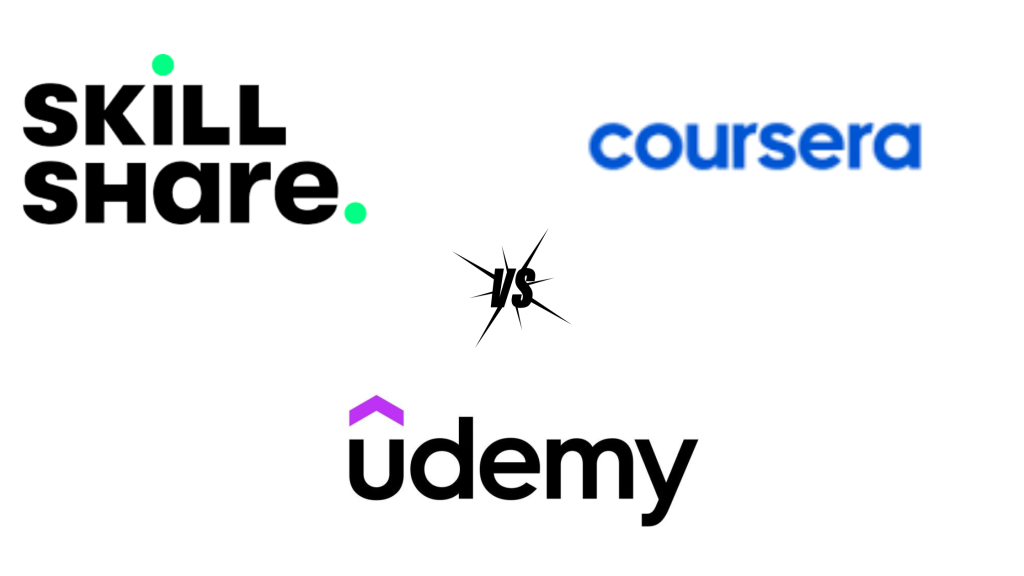
In the rapidly evolving landscape of online education, three platforms have emerged as leaders: Coursera, Skillshare, and Udemy. Each offers unique features, course structures, and benefits tailored to different learning needs and preferences. This article compares these platforms across several key dimensions: course variety, instructional quality, pricing, user experience, and certification.
Course Variety
- Focus: Coursera offers a wide range of courses, but it excels in academic and professional subjects.
- Content Providers: Partnered with top universities and institutions (e.g., Stanford, Yale, Google).
- Types of Courses: Offers courses, specializations, professional certificates, and degree programs.
- Focus: Specializes in creative fields, including design, photography, writing, and entrepreneurship.
- Content Providers: Courses are created by practitioners and experts in various creative industries.
- Types of Courses: Primarily project-based classes with a hands-on approach.
- Focus: Covers an extensive array of subjects, from tech and business to personal development and hobbies.
- Content Providers: Courses created by individual instructors worldwide, providing a broad range of perspectives.
- Types of Courses: Offers standalone courses with varying levels of depth.
Instructional Quality
- Quality Control: High due to partnerships with prestigious institutions. Courses often include peer-reviewed assignments and interactive content.
- Instructor Expertise: Courses are taught by university professors and industry professionals.
- Learning Experience: Structured with deadlines and rigorous assessments, mimicking traditional academic courses.
- Quality Control: Varies, but generally high for creative fields due to the platform’s reputation and community standards.
- Instructor Expertise: Practitioners and professionals with real-world experience in their fields.
- Learning Experience: Focuses on project-based learning, encouraging hands-on practice and peer interaction.
- Quality Control: Mixed, as anyone can publish a course. However, reviews and ratings help gauge course quality.
- Instructor Expertise: Wide-ranging, from industry experts to amateurs sharing their knowledge.
- Learning Experience: Flexible, self-paced learning with lifetime access to purchased courses.
Pricing
Coursera
- Cost Structure: Offers free courses, but many require payment for graded assignments and certificates. Subscriptions available for specializations and professional certificates.
- Subscription Model: Coursera Plus provides unlimited access to over 7,000 courses for an annual fee.
Skillshare
- Cost Structure: Primarily a subscription-based model, offering unlimited access to all classes for a monthly or annual fee.
- Free Trial: Offers a free trial period, allowing users to explore the platform before committing.
Udemy
- Cost Structure: Courses are sold individually, often at discounted rates. Prices can range from $10 to $200 per course.
- Sales and Discounts: Frequent sales and promotions make it easy to find courses at reduced prices.
User Experience
Coursera
- Platform: Highly professional and polished interface, similar to university online portals.
- Community Interaction: Forums, peer reviews, and study groups enhance the learning experience.
- Flexibility: Courses have set schedules, but many offer flexible deadlines.
Skillshare
- Platform: User-friendly with a focus on creativity and community. Clean, intuitive design.
- Community Interaction: Strong community aspect with peer feedback, project sharing, and collaboration.
- Flexibility: Entirely self-paced, allowing users to learn at their convenience.
Udemy
- Platform: Simple and straightforward interface, making it easy to find and start courses.
- Community Interaction: Discussion boards for each course, but less interactive compared to Coursera and Skillshare.
- Flexibility: Fully self-paced, with lifetime access to courses once purchased.
Certification
Coursera
- Credentials: Offers certificates for most courses, and accredited degrees and professional certificates.
- Value: Certificates from well-known universities and companies can add significant value to a resume.
Skillshare
- Credentials: Does not offer formal certifications. Focus is on skill acquisition and project completion.
- Value: Ideal for personal development and creative skill-building, less for formal qualifications.
Udemy
- Credentials: Provides certificates of completion, but they are not accredited.
- Value: Useful for personal and professional development, but less recognized than Coursera’s certifications.
Conclusion
Choosing the right platform depends on your learning goals:
- Coursera is best for those seeking academic rigor, professional development, and accredited certifications.
- Skillshare is ideal for creative professionals and hobbyists looking to develop practical skills through project-based learning.
- Udemy offers the greatest variety and flexibility, making it suitable for anyone looking to learn new skills or explore interests at their own pace.
Each platform brings its unique strengths to the table, catering to different types of learners and learning objectives.
